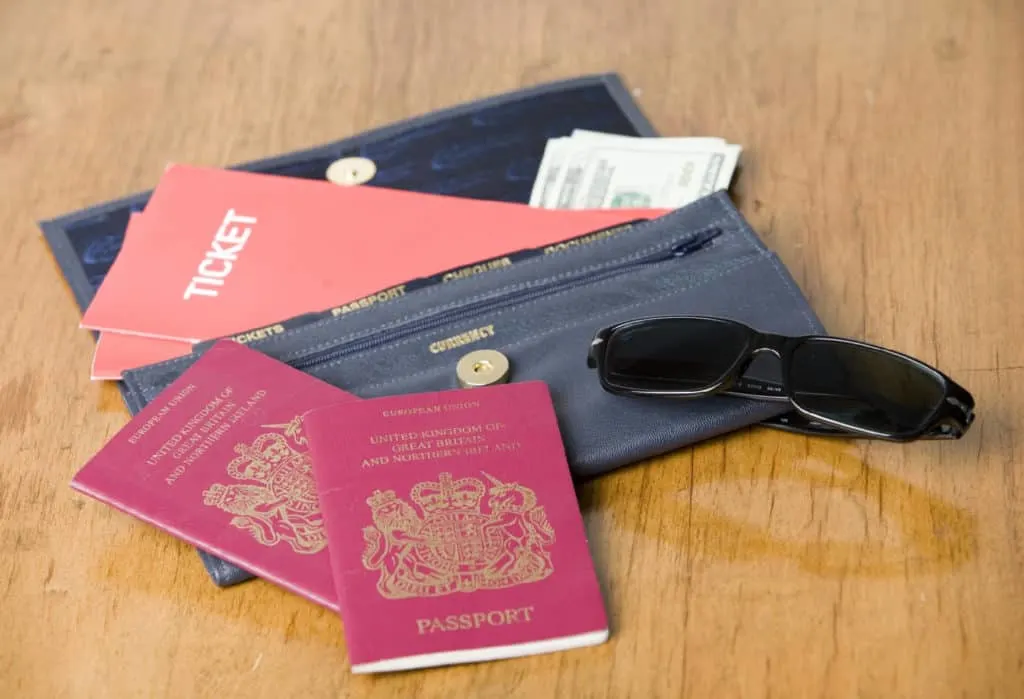It’s fair to say that the 2020s have been throwing us all kinds of curve balls when it comes to travel. However, even before the pandemic, there were going to be some pretty important changes for UK families hoping to holiday in Europe from 2021. This post is a reminder about what you need to know about travelling to the EU after Brexit.
*Advertisement feature*
As 2022 continues I’m crossing everything that international travel will be returning to something closer to the pre-pandemic normal. No one needs the extra expense of PCR tests or quarantine hotels when all they want is to escape from the rat run for a week or two.
But the fall out from the Brexit deal is something no one can avoid.
Here are some of the important things to consider about travelling to the EU this year:
Contents - jump to what you'd like to know
Are British passports still valid?

The good news is you don’t automatically need to get new passports for your family after Brexit. However, you need to check the dates on all your passports very carefully before you travel.
The EU is saying you need three months left on your passport when you travel. But the UK Government is advising six months, as are some airlines. Check when you book your tickets otherwise you may not be allowed to board your flight.
Some people are being caught out because they have more than three months left on their passport but it is more than 10-years-old. This has happened because the Passport Office rolled over months from previous passports when they were renewed.
After Brexit, EU countries are not accepting UK passports that are more than 10-years-old regardless of when they expire.
So your current UK passport will be valid in the EU as long as:
- it has at least another six months to run from the start date of your holiday;
- AND it is less than 10 years old.
The only exception is if you are planning to holiday in Ireland. Here you can use your passport as long as it is in date for the length of your stay.
Will your EHIC be valid?
UK-issued European Health Insurance Cards (EHICs) are still valid until their expiry date. Once they expire you can replace them with a UK Global Health Insurance Card (GHIC).
What is a GHIC?
You can use a GHIC to get ‘necessary healthcare’ from state services when you’re visiting an EU country.
Necessary healthcare means healthcare which becomes medically necessary during your stay, and you cannot reasonably wait until you’re back in the UK to get it.
You can apply for a GHIC free online. Beware of unofficial websites that may charge if you apply through them.
An EHIC or GHIC is free of charge and your card will normally arrive within 10 days.
Find out how to apply for a GHIC on the NHS website.
Travel insurance for your family holiday in Europe post-Brexit
Getting the best travel insurance policy, whether it’s a single or an annual policy, for your family is more important than ever.
You need to ensure you are covered for:
- The length of your trip
- The type of holiday – for example, cruises require additional cover
- The region you are travelling to
- The activities you plan to do – skiing, and water and motor sports aren’t covered as standard
- Cancellation and your trip being cut short
- Loss and theft of possessions and cash
- Your medical expenses, including emergency treatment, getting home and repatriation if someone dies.
Travelling without insurance really isn’t an option. The Government estimates that treatment and getting home after a moped accident in Greece could cost £25,000.
To make sure you get the best travel insurance policy find and compare travel insurance by customer reviews.
Driving abroad after Brexit

Many of our recent holidays in Europe have involved hiring a car.
In fact we prepared to drive in Crete ahead of one of the pervious Brexit deadlines. The steps we took were eventually obsolete but it was good preparation.
Here’s what’s now necessary when driving in the EU:
Hiring a car abroad
If you are hiring a car abroad you need to bring the following as standard:
- a DVLA code to share your up-to-date driving license information with your hire company
- your driver’s license
- your passport.
See information below about international driving permits (IDP) and where you need them.
Driving your own vehicle in the EU
You need to get a UK sticker for your vehicle if you don’t already have one on your number plate.
It’s also important to carry an up-to-date vehicle log book (V5C) with you when on holiday. You may have to show it if you’re stopped at a port or while driving abroad.
International Driving Permits – when you need them
Pre-Brexit it was unclear about whether a international driving permit (IDP) would be needed in the EU.
The good news is you do not need one to visit and drive in the EU, Switzerland, Iceland or Liechtenstein.
However you might need one to drive in some EU countries and Norway if you have:
- a paper driving licence
- a licence that was issued in Gibraltar, Guernsey, Jersey or the Isle of Man.
An International Drivers’ Permit can be bought from a UK post office before your holiday and costs £5.50. You’ll need to take along a photo drivers license and a passport sized photo, which will be glued to your International Drivers’ Permit.
Will Brits need a visa for travelling to the EU after Brexit?
No, as long as you are on holiday and don’t stay for more than 90 days in a 180 day period. This applies to most EU counties plus Iceland, Liechtenstein, Norway and Switzerland.
If you are intending to holiday in Bulgaria, Croatia, Cyprus or Romania your visits here will not count towards the 90 day total.
If you are planning a trip longer than 90 days you will need a visa. Most families planning a holiday won’t need to worry.
Will Brits be able to use EU lanes at border control?

No. From 2021 you will have to use separate lanes to EU, EEA and Swiss citizens.
Be aware that this might mean extra time at immigration – a big downside when you’re queuing with kids.
You also won’t have the fast track benefits of being an EU citizen. This means you may be quizzed about how long you are staying, whether you have booked onward travel and whether you have enough money for you stay.
Travelling with pets after Brexit
Taking your family pet abroad has become more complicated post-Brexit.
UK issued Pet Passports are no longer valid for travel into the EU. If you want to take your pet on holiday you need to start a pre-travel process four months before your holiday.
There’s more details about the extra actions you need to take on the Government website.
What’s happened to data roaming charges after Brexit?

Now here’s something important to consider for families travelling with teens who are usually glued to their smartphones.
EU data roaming rules will no longer apply to UK citizens. In theory, this could mean a return to huge phone bills after foreign holidays.
However, there’s a glimmer of hope depending on your network provider. Find out who is waiving roaming charges and who is reintroducing them.
Are you thinking about booking a European family holiday? Do you have any questions about travelling to the EU after Brexit?
Disclosure: this an advertorial feature written in collaboration with Compare By Review.
Why not use Pinterest to save this post about travelling to the EU after Brexit?



Sam - West Lothian Kids
Sunday 22nd of November 2020
What a great post! I had put Brexit aside and been trying to get my head around all the COVID stuff. Ooops
Claire Hall - Tin Box Traveller
Monday 23rd of November 2020
There's far too much going on at the moment!!!